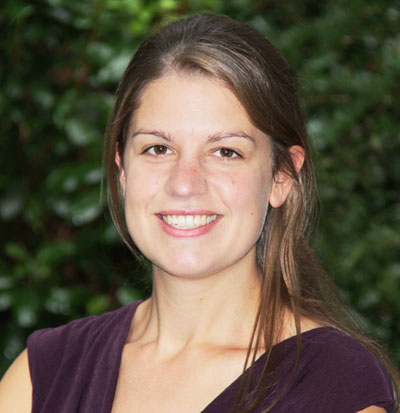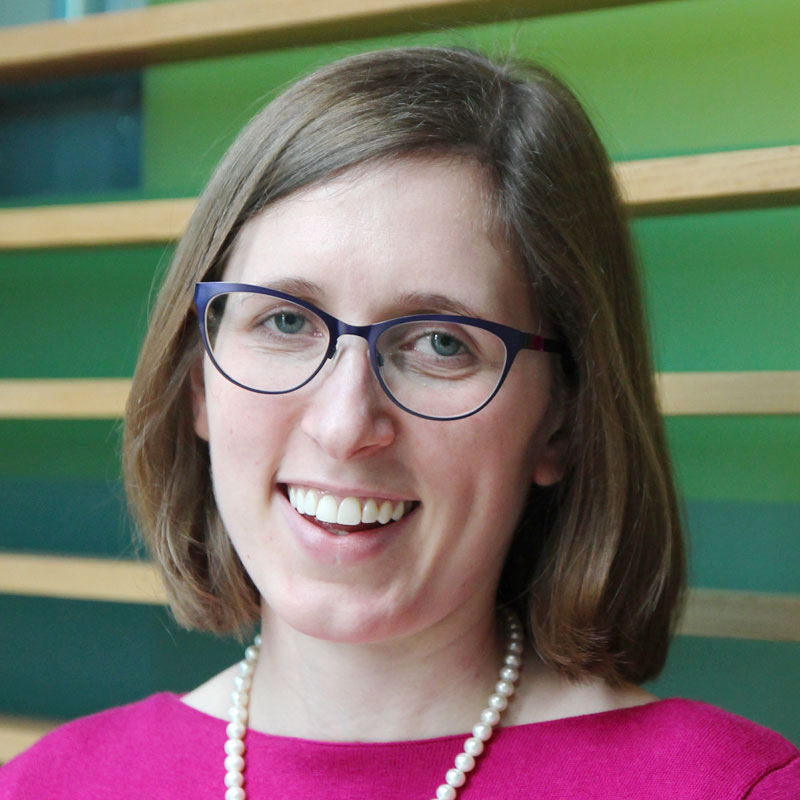Emma Davenport and Hilary Martin to lead research groups in the Human Genetics Programme
The Wellcome Sanger Institute is delighted to announce that it will be welcoming two new members of Faculty in September and October 2018: Hilary Martin and Emma Davenport. Both researchers have strong experience in studying the contributions of genetic variation to disease, or deciding whether or not a drug will be effective. Their work will help to lay the foundations of understanding needed for precision medicine – where the most effective treatments for individuals can be determined by reading the sequence of their genomes.

Emma Davenport will join the Wellcome Sanger Institute in October from Harvard Medical Schools, Brigham and Women’s Hospital and the Broad Institute. Her research interests lie in combining genomic analysis with clinical data to understand the underlying genetic reasons why some patients are able to overcome infections more quickly than others and why people respond differently to the same drug.
At the Sanger Institute Emma will be focusing on discovering the differences in our genomes that determine how active our genes are and how they affect how our bodies respond to particular drug treatments. To do this she will build a team that will use both computational approaches and wet laboratory experiments to identify the areas of the genome that play a role in a disease by lowering or raising the activity of specific genes, discover which biological processes are involved, in which cells and when. This work will help to identify new drug targets and biomarkers that could be used in diagnostic tests.
Emma’s research will also show how a person’s genetic makeup interacts with drugs to enable or inhibit their effectiveness. Some drugs work better when certain genes are more or less active. While other drugs have their effect by working directly on the DNA regions that control a gene’s activity, either driving its activity up to supply unmet need, or reducing its activity to remove damaging excess.
“I’m excited to be joining the Sanger Institute’s Human Genetics Programme. I’m fascinated by how small differences in our genetic makeup can affect the way our bodies react to drugs by influencing how active our genes are. It is these tiny variations that explain why a particular drug works for some people, but not for others. If we can better understand where these differences lie in our genomes, which biological processes they act on, in which cells and when, then we can identify biomarkers for diagnostic tests and genetic profiling approaches that doctors can use in precision medicine to stratify patients into groups that will respond better to one type of treatment or another.”
Emma Davenportwho will start as a Faculty member at the Wellcome Sanger Institute in October 2018 and is currently a postdoctoral fellow in the Raychaudhuri Laboratory at Harvard Medical School Brigham and Women’s Hospital, and the Broad Institute
In her faculty position at the Sanger Emma will be building up a team to investigate the response to drug treatment in patients with inflammatory diseases using statistical methods and RNA-sequencing to profile gene activity in the blood.

Hilary Martin is currently a postdoctoral fellow at the Sanger Institute working on the Deciphering Development Disorders (DDD) study and the East London Genes and Health (ELGH) project. She will start as a member of Faculty in September. Her research interests lie in understanding how having related parents may alter an individual’s risk of disease, and how the genetic architecture of health and disease may differ in populations with a high frequency of parental relatedness.
Most recently, Hilary has been researching families with children with rare developmental disorders. She has been identifying conditions that are caused when a child inherits a damaged copy of a gene from both parents, and estimating how much this form of inheritance contributes to the overall number of children with a rare developmental disorder.
Hilary’s work has uncovered several surprises. The first is that the proportion of children affected by this form of inheritance varies dramatically between populations. The second is that in families where parents are not closely related, fewer than 5 per cent of children are likely to be due solely to children inheriting two damaged copies of a gene. Even in families in which this mode of inheritance was assumed to be common (those with multiple affected children, or related parents), Hilary found that it was operating in fewer than half the patients.
These findings suggest that much of a person’s biological makeup, and hence their health and risk of disease, is the result of the complex interplay between many different forces operating in the genome. Such forces include the effect of DNA regions that control gene activity and the ways that genes exert an influence on one another to enhance or repress each other’s effects. It is this complexity that Hilary’s research group will seek to unpick to enable more informed genetic counselling, diagnosis and treatment decisions. They will be comparing DNA sequences and clinical records between people with related versus unrelated parents, building on and extending the work of the DDD and ELGH projects to investigate the role of different types of genetic variation in rare and common diseases, and how this differs between populations.
“I am thrilled to be founding my own team at the Sanger Institute. The Institute’s expertise in applying high-throughput genetic sequencing and computational analysis to discover disease-causing genetic changes is unparalleled. I’m excited about exploring how the genetic architecture of traits differs between populations, and am looking forward to working with such knowledgeable and creative colleagues. I hope that our findings will eventually help families across the UK and beyond.”
Hilary Martin starting as Faculty member at the Wellcome Sanger Institute in September 2018 and is currently a postdoctoral fellow at the Institute, where she has primarily been working with the Barrett and Hurles groups
Matt Hurles, Head of Human Genetics Programme at the Sanger Institute is delighted that Emma and Hilary will be joining the faculty. Over the next few years the Programme is seeking to concentrate its research efforts on exploring how the effects of all regions of the genome combine to influence a person’s health and risk of disease.
“I am very excited that Emma and Hilary will be leading new groups in Sanger’s Human Genetics Programme. Their skills, expertise and exciting research plans will help us to understand more about how our individual genetic landscapes affect our health and susceptibility to disease.”
Matt Hurles Head of the Human Genetics Programme, Wellcome Sanger Institute
More information
Selected websites
The Wellcome Sanger Institute
The Wellcome Sanger Institute is one of the world’s leading genome centres. Through its ability to conduct research at scale, it is able to engage in bold and long-term exploratory projects that are designed to influence and empower medical science globally. Institute research findings, generated through its own research programmes and through its leading role in international consortia, are being used to develop new diagnostics and treatments for human disease. To celebrate its 25th year in 2018, the Institute is sequencing 25 new genomes of species in the UK. Find out more at scion-02.sandbox.sanger.ac.uk or follow @sangerinstitute


